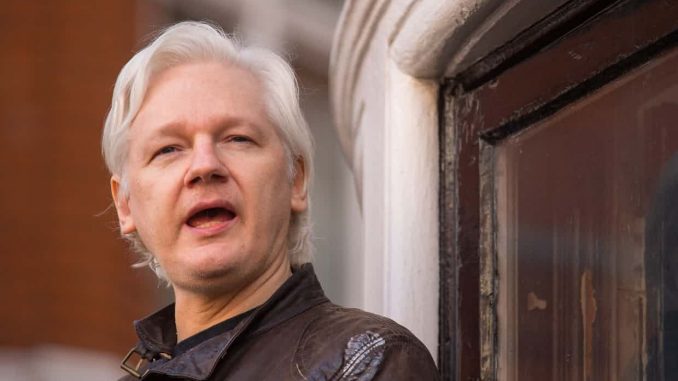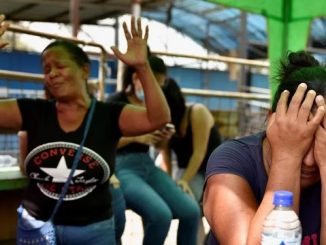
Wikileaks co-founder Julian Assange has been arrested at the Ecuadorian embassy in London.
Mr Assange took refuge in the embassy seven years ago to avoid extradition to Sweden over a sexual assault case that has since been dropped.
The Met Police said he was arrested for failing to surrender to the court and following a US extradition request.
Ecuador’s president said it withdrew his asylum after repeated violations of international conventions.
But Wikileaks tweeted that Ecuador had acted illegally in terminating Mr Assange’s political asylum “in violation of international law”.
Home Secretary Sajid Javid tweeted: “I can confirm Julian Assange is now in police custody and rightly facing justice in the UK.”
Mr Assange, an Australian national, set up Wikileaks in 2006 with the aim of obtaining and publishing confidential documents and images. The organisation hit the headlines four years later when it released footage of US soldiers killing civilians from a helicopter in Iraq.
Former US intelligence analyst Chelsea Manning was arrested in 2010 for disclosing more than 700,000 confidential documents, videos and diplomatic cables to the anti-secrecy website.
She said she only did so to spark debates about foreign policy, but US officials said the leak put lives at risk.
Mr Assange, 47, had been in the Ecuadorean embassy in London since 2012, after seeking asylum there to avoid extradition to Sweden on a rape allegation – which he denied and was later dropped.
But he still faces a lesser charge of skipping bail in 2012 and he says this could lead to an extradition to the US for publishing US secrets on the Wikileaks website.
Scotland Yard said it was invited into the embassy by the ambassador, following the Ecuadorian government’s withdrawal of asylum.
After his arrest for failing to surrender to the court, police said he had been further arrested on behalf of US authorities under an extradition warrant. He is accused in the US of “computer-related offences”, the Home Office said.
Mr Assange was initially taken to a central London police station and would appear at Westminster Magistrates’ Court “as soon as is possible”, the statement added.
Ecuador ‘reached its limit’
Ecuadorean president Lenin Moreno said the country had “reached its limit on the behaviour of Mr Assange” after he intervened in the internal affairs of other states.
Mr Moreno said: “The most recent incident occurred in January 2019, when WikiLeaks leaked Vatican documents.
“This and other publications have confirmed the world’s suspicion that Mr Assange is still linked to WikiLeaks and therefore involved in interfering in internal affairs of other states.”
His accusations against Mr Assange also included blocking security cameras at the embassy, accessing security files and confronting guards.
Mr Moreno said the British government had confirmed in writing that Mr Assange “would not be extradited to a country where he could face torture or the death penalty”.
It comes a day after Wikileaks said it had uncovered an extensive spying operation against its co-founder at the Ecuadorean embassy.
There has been a long-running dispute between the Ecuadorean authorities and Mr Assange about what he was and was not allowed to do in the embassy.
BBC diplomatic correspondent James Landale said that over the years they have removed his access to the internet and accused him of engaging in political activities – which is not allowed when claiming asylum.
He said: “Precisely what has happened in the embassy is not clear – there has been claim and counter claim.”
Mr Assange will initially face UK legal proceedings but could be extradited to the US over the Wikileaks revelations, he added.
Foreign Secretary Jeremy Hunt said the arrest was the result of “years of careful diplomacy”.
He said: “We’re not making any judgement about Julian Assange’s innocence or guilt, that is for the courts to decide. But what is not acceptable is for someone to escape facing justice and he has tried to do that for a very long time.”
Press freedom organisation Reporters Without Borders said that the UK should resist extradition, because it would “set a dangerous precedent for journalists, whistleblowers, and other journalistic sources that the US may wish to pursue in the future”.
The actress Pamela Anderson, who has visited the embassy to support Mr Assange, said the arrest was a “vile injustice” that proved he was “right all along” about the threat of extradition.
Australia’s Foreign Minister Marise Payne said he would continue to receive “the usual consular support” and that consular officers will try to visit him.
Timeline: Julian Assange saga
- August 2010 – The Swedish Prosecutor’s Office first issues an arrest warrant for Mr Assange. It says there are two separate allegations – one of rape and one of molestation. Mr Assange says the claims are “without basis”
- December 2010 – Mr Assange is arrested in London and bailed at the second attempt
- May 2012 – The UK’s Supreme Court rules he should be extradited to Sweden to face questioning over the allegations
- June 2012 – Mr Assange enters the Ecuadorean embassy in London
- August 2012 – Ecuador grants asylum to Mr Assange, saying there are fears his human rights might be violated if he is extradited
- August 2015 – Swedish prosecutors drop their investigation into two allegations – one of sexual molestation and one of unlawful coercion because they have run out of time to question him. But he still faces the more serious accusation of rape.
- October 2015 – Metropolitan Police announces that officers will no longer be stationed outside the Ecuadorean embassy
- February 2016 – A UN panel rules that Mr Assange has been “arbitrarily detained” by UK and Swedish authorities since 2010
- May 2017 – Sweden’s director of public prosecutions announces that the rape investigation into Mr Assange is being dropped
- July 2018 – The UK and Ecuador confirm they are holding ongoing talks over the fate of Mr Assange
- October 2018 – Mr Assange is given a set of house rules at the Ecuadorean embassy in London. He then launches legal action against the government of Ecuador
- December 2018 – Mr Assange’s lawyer rejects an agreement announced by Ecuador’s president to see him leave the Ecuadorean embassy
- February 2019 – Australia grants Mr Assange a new passport amid fears Ecuador may bring his asylum to an end
- April 2019 – The Metropolitan Police arrests him for “failing to surrender to the court” over a warrant issued in 2012
Source: bbc.co.uk








Be the first to comment